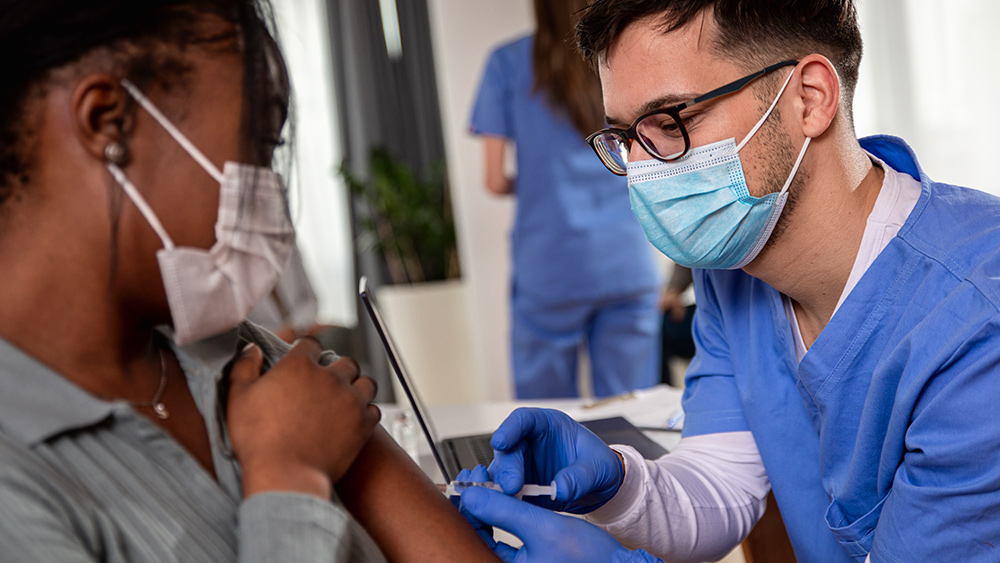Vaccine FAILURE cover-up: CDC limits tracking of “breakthrough” coronavirus infections that occur in fully vaccinated people
05/21/2021 / By Ramon Tomey

The Centers for Disease Control and Prevention (CDC) decided to limit its tracking of people who contracted the Wuhan coronavirus (COVID-19) despite vaccination. It recorded more than 9,000 breakthrough COVID-19 cases – a tiny percentage of the total number immunized. The CDC’s move drew concern from scientists who remarked that it only made investigations on the breakthrough infections more difficult.
According to the public health agency, it would only report “patients with COVID-19 vaccine breakthrough infection that were hospitalized or died” effective May 14. It cited a need to “maximize the quality of the data collected” for the decision. The CDC nevertheless acknowledged that breakthrough cases are to be expected as no vaccine is 100 percent effective in preventing illness.
CDC official Dr. Thomas Clark elaborated that it shifted its reporting strategy due to “few worrying patterns” in their collected data. He continued that the agency’s current data suggested a focus on more severe cases. “I don’t think we’re missing out on this data. It’s just sort of a package of how we’re looking at these questions [regarding breakthrough infections],” Clark said in an interview.
However, the public health agency noted that the official numbers are probably an undercount. This is because its Vaccine Adverse Event Reporting System is passive and relies on voluntary reporting from state health departments. These departments may be reporting incomplete figures, the CDC added.
Clark commented that the agency has planned other vaccine studies to look at the severity of COVID-19 cases in both vaccinated and unvaccinated people. It also planned to look at the frequency of infections caused by circulating Wuhan coronavirus variants in both groups. The CDC has partnered with a network of health centers for this particular purpose.
But some scientists have argued in favor of tracking and sequencing all breakthrough infections. They claimed that it helps figure out who may be more at risk, when vaccine protection decreases and if new variants bypass vaccine-induced protection. Scripps Research Translational Institute Founder and Director Dr. Eric Topol said: “We shouldn’t be narrowing the focus, [Instead,] we should be broadening and [developing] a systematic plan.”
Washington University in St. Louis Associate Vice Chancellor Michael Kinch said information on breakthrough COVID-19 cases should be recorded as much as possible. He added that cases that do not progress to hospitalization should also be tracked nevertheless as some patients could eventually go down that path. “It’s essential that we stay on top of this. If we let our guard down, we will pay the price,” Kinch said.
The CDC appears to be covering up the real reason why people still get COVID-19 despite getting immunized
Observations on the breakthrough COVID-19 cases found that affected patients showed mild symptoms or none at all. But according to Alex Greninger of the University of Washington Medical Center, the specific mechanisms behind these breakthrough infections should be further examined.
Greninger explained that those who mount less of an immune response to vaccines are conventionally more susceptible to breakthrough infections. However, he mentioned seeing a few cases where people still got infected despite their immune systems mounting a strong response.
Other researchers are looking at the role of Wuhan coronavirus variants in breakthrough infections. But Stefan Green of Rush University‘s Regional Innovative Public Health Laboratory said that studying this aspect will be challenging – given the number of small cases. He continued that some cases may not be detected at all due to having mild symptoms or none at all. Green also remarked that he had seen cases where the viral loads were too low to perform whole-genome sequencing on.
In reality, the vaccines themselves are the main cause of breakthrough infections. One such vaccine is the Pfizer/BioNTech BNT162b2 shot, which both the U.S. and Israel used. In fact, an Israeli research team discovered that the mRNA vaccine actually made people more susceptible to contracting certain Wuhan coronavirus strains. (Related: The vaccine is the pandemic: MULTIPLE countries seeing spike in covid deaths AFTER covid vaccines began.)
Researchers from Tel Aviv University (TAU) and Israeli health provider Clalit Health Services found that those who completed the two-dose Pfizer/BioNTech vaccine were eight times more likely to contract the South African B1351 variant. They also found that those who got at least one dose of the mRNA vaccine were more likely to contract the British B117 variant.
Lead researcher and TAU professor Adi Stern said: “We found a disproportionately higher rate of the South African [B1351] variant among people vaccinated with a second dose, compared to the unvaccinated group. Based on patterns in the general population, we would have expected just one case of the South African variant – but we saw eight.” She commented that her team’s study suggested that the B1351 strain could bypass vaccine-induced immunity “to some extent.” (Related: Study finds Pfizer coronavirus vaccine puts people at HIGHER risk of covid “variants.”)
Visit Pandemic.news to read more articles about breakthrough Wuhan coronavirus infections.
Sources include:
Tagged Under: B117 strain, B1351 strain, Big Pharma, BioNTech, breakthrough infection, Centers for Disease Control and Prevention, coronavirus infection, coronavirus vaccine, covid-19 pandemic, Pfizer, Vaccine Adverse Event Reporting System, Wuhan coronavirus


















